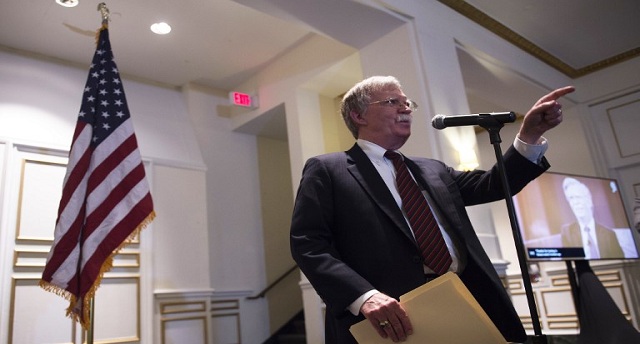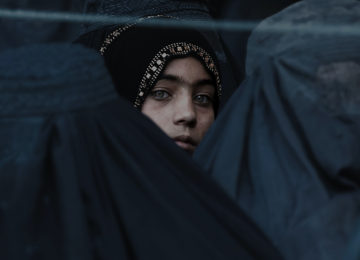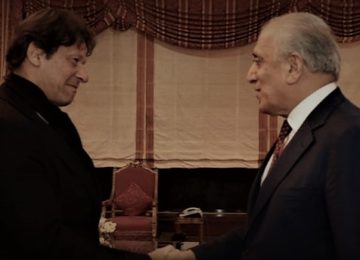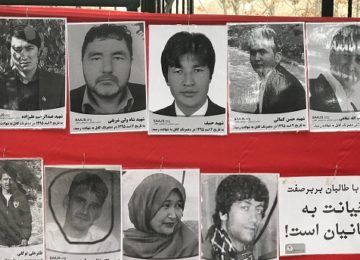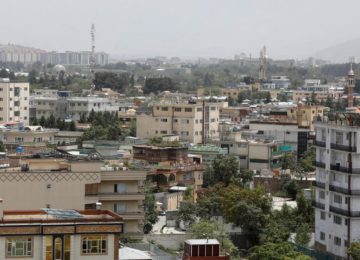President Trump’s National Security Advisor, John Bolton, has made a withering attack on the International Criminal Court (ICC), threatening prosecutions against personnel and retaliation against any country cooperating with the Court if it ‘goes after’ America. Bolton’s intervention comes as the judges of the ICC’s Pre-Trial Chamber weigh up whether or not to authorise a full investigation into war crimes committed in Afghanistan. The alleged perpetrators include not only the Taleban and Afghan government forces, but also the United States military and CIA over their use of torture. If an investigation is authorised, says AAN Co-Director Kate Clark (with input from Sari Kouvo and Ehsan Qaane), the Afghan government would be put in an impossible position, legally obliged to cooperate with the Court and now threatened by its main financial and military backer if it does so.
John Bolton’s speech (read the full text here) on 10 September 2018 – what he called“a major announcement on US policy toward the International Criminal Court” – was excoriating. He singled out the Court’s possible investigations into United States and Israel, (1) castigating it as a “supranational tribunal” that trampled national sovereignty, a “free-wheeling global organization claiming jurisdiction over individuals without their consent.” Individuals, of course, are not able to choose a jurisdiction when it comes to criminal law and, in this case, Afghanistan is one of the 123 countries that has ratified the Rome Statute. The Court does, therefore, have jurisdiction in Afghanistan. It also has jurisdiction over anyone of any nationality committing war crimes on Afghan soil, including nationals of non-state parties, such as Americans. Washington has always vehemently disagreed with this stance (more on which later).
Bolton called the Court’s claim to hold perpetrators of the most egregious atrocities to account theoretical only:
In practice… the court has been ineffective, unaccountable, and indeed, outright dangerous. Moreover, the largely unspoken, but always central, aim of its most vigorous supporters was to constrain the United States. The objective was not limited to targeting individual US service members, but rather America’s senior political leadership, and its relentless determination to keep our country secure.
Bolton’s tirade comes as the judges of the Pre-Trial Chamber are weighing up whether or not to launch a full investigation into the war crimes allegedly perpetrated in Afghanistan since May 2003 when the Rome Statute setting up the Court came into force in Afghanistan. It is almost one year (November 2017) since ICC Chief Prosecutor Fatou Bensouda requested that full investigation (see AAN reporting here). Her preliminary examination had indicated that war crimes and crimes against humanity had taken place, were grave enough and of a scale to merit the Court’s attention, and that domestic courts were either unwilling or unable to take action. In February 2018, victims of war crimes who were asked for their views and experiences, “overwhelmingly” backed an investigation (read AAN reporting here). The court received 1.7 million victim’s representations on a range of crimes:
[M]urder; attempted murder; imprisonment or other severe deprivation of liberty; torture; rape; sexual violence; persecution; enforced disappearance of persons; other inhumane acts; attack against civilian population; attack against protected objects; destruction of property; pillage; forced displacement; outrages upon personal dignity; and denying a fair trial
Since February, everyone has been waiting for the Pre-Trial Chamber’s decision, to authorise an investigation or not. The decision was expected in the spring but was delayed after a new panel of judges took over in April. The new panel had to consider the case from scratch. However, as Bolton has said, “any day now,” it should announce their decision.
If the Pre-Court Chamber does authorise an investigation, the main task of the team of investigators will be to collect victim and witness statements and other evidence to build cases against specific individuals that could lead to their prosecution. This is necessary as the ICC can only prosecute individuals; it cannot prosecute governments or institutions.
The ICC has been robustly defended by the President of the Assembly of States Parties to the ICC, the oversight and legislative body of the Court, South Korean Judge O-Gon Kwon. Without referring to Bolton’s remarks directly, Kwon described the ICC as independent and impartial, “crucial for ensuring accountability for the gravest crimes under international law” and mandated to “put an end to impunity for the most serious crimes.” He stressed that the Court was only complementary to domestic jurisdictions. “The Court is encouraged,” he said, “by the strong support and cooperation, not only of the 123 States Parties to the Rome Statute, but also by the support it has received from other States and international organizations and civil society in carrying out its mandate.”
Elsewhere, France has said the ICC “must be able to act and exercise its prerogatives without hindrance, in an independent and impartial manner, within the legal framework defined by the Rome Statute.” The German Foreign Ministry tweeted: “We are committed to the work of the ICC – in particular when it comes under fire.” Backing has also been voiced by Liechtenstein, Austria and the United Nations.
The allegations against US personnel
In November 2017, the Office of the Prosecutor decided that, along with credible evidence against the Taleban, other insurgent groups and Afghan government forces,(2)there was also a “reasonable basis” to believe that, during interrogations of security detainees and in conduct supporting those interrogations, members of the US armed forces and the CIA:
… resorted to techniques amounting to the commission of the war crimes of torture, cruel treatment, outrages upon personal dignity, and rape… Specifically:
Members of US armed forces appear to have subjected at least 61 detained persons to torture, cruel treatment, outrages upon personal dignity on the territory of Afghanistan between 1 May 2003 and 31 December 2014. The majority of the abuses are alleged to have occurred in 2003-2004.
Members of the CIA appear to have subjected at least 27 detained persons to torture, cruel treatment, outrages upon personal dignity and/or rape on the territory of Afghanistan and other States Parties to the Statute (namely Poland, Romania and Lithuania) between December 2002 and March 2008. The majority of the abuses are alleged to have occurred in 2003-2004.
Crucially, the Office of the Prosecutor found that these “alleged crimes were not the abuses of a few isolated individuals” but rather were part of a policy:
The Office considers that there is a reasonable basis to believe these alleged crimes were committed in furtherance of a policy or policies aimed at eliciting information through the use of interrogation techniques involving cruel or violent methods which would support US objectives in the conflict in Afghanistan.
National Security Advisor Bolton has accused Bensouda of making an unfair and biased attack on America. A full ICC investigation, he said, would be
… against these American patriots, who voluntarily went into harm’s way to protect our nation, our homes, and our families in the wake of the 9/11 attacks. The ICC prosecutor has requested to investigate these Americans for alleged detainee abuse, and perhaps more – an utterly unfounded, unjustifiable investigation.
Yet, the publically available evidence of the deliberate and systematic use of torture by the CIA and US military and the rendition of individuals to and from Afghanistan during the early years of the ‘war on terror’ is abundant. What the US administration euphemistically called ‘enhanced interrogation techniques’ included waterboarding, where a person is strapped head downwards on a sloping board with their mouth and nose covered and large quantities of water are poured over their face; this subjects the person to the experience of drowning.The techniques used also included being forced to stand for many hours, being put in painful stress positions, suspending people again in painful positions, making threats to family members, preventing individuals from sleeping for as long as a week and ‘rectal feeding’ where officers gave detainees nutrients through a tube into the anus. A December 2014 US Senate Select Committee on Intelligence report said officers considered this practice “a means of behavior control.”
There has been a wealth of investigations into this authorised use of torture by the media, human rights groups and lawyers, as well as official reports by the US government (3) including the US Senate report (read the report here and AAN analysis here). The CIA, the Senate Intelligence Committee found, built its own facilities so that it could evade visits by the International Committee of the Red Cross which it thought likely to happen if detainees were housed on military bases; the report described conditions at one facility in Afghanistan (probably the one known as the Salt Pit) as follows:
CIA detainees at the COBALT detention facility were kept in complete darkness and constantly shackled in isolated cells with loud noise or music and only a bucket to use for human waste. Lack of heat at the facility likely contributed to the death of a detainee. The chief of interrogations described COBALT as a “dungeon.” Another senior CIA officer stated that COBALT was itself an enhanced interrogation technique. At times, the detainees at COBALT were walked around naked or were shackled with their hands above their heads for extended periods of time. Other times, the detainees at COBALT were subjected to what was described as a “rough takedown,” in which approximately five CIA officers would scream at a detainee, drag him outside of his cell, cut his clothes off, and secure him with Mylar tape. The detainee would then be hooded and dragged up and down a long corridor while being slapped and punched.
Crimes not prosecuted
Part of Bolton’s attack is based on his claim that the ICC is an unfair ‘supranational’ institution. He accuses it of denying the authority of the US courts and government and ignoring the ‘complementarity principle’ whereby it should only act where domestic courts are unwilling or unable to.
The International Criminal Court is superfluous, given that domestic US judicial systems already hold American citizens to the highest legal and ethical standards. US service members in the field must operate fully in accordance with the law of armed conflict. When violations of law do occur, the United States takes appropriate and swift action to hold perpetrators accountable. We are a democratic nation with the most robust system of investigation, accountability, and transparency in the world. We believe in the rule of law, and we uphold it. We don’t need the ICC to tell us our duty or second-guess our decisions.
…
If the ICC prosecutor were to take the complementarity principle seriously, the court would never pursue an investigation against American citizens, because we know that the US judicial system is more vigorous, more fair, and more effective than the ICC.The ICC prosecutor’s November 2017 request, of course, proves that this notion, and thus the principle of complementarity is completely farcical. The ICC prosecutor will pursue what investigations it chooses to pursue, based upon its own political motives, and without any serious application of the complementarity principle.
However, Bensouda requested a full investigation precisely because US administrations and courts have repeatedly chosen not to prosecute alleged torturers. President George W Bush himself authorised the methods used and although President Obama banned torture as soon as he took office in 2009, his administration decided not to prosecute. “We tortured some folks,” said Obama (quoted here). “You know, it is important for us not to feel too sanctimonious in retrospect about the tough job that those folks had. And a lot of those folks were working hard under enormous pressure and are real patriots.”
Individuals have tried to use US courts to seek redress,(4) but almost all have failed when judges dismissed their lawsuits in the initial stages after the US government argued that prosecutions would reveal state secrets. The one exception was a private claim brought by two survivors of CIA torture and the family of a third man, the Afghan Rahmat Gul who was killed in CIA custody in 2002, against the two psychologists who designed the agency’s torture programme. The Department of Justice did not try to derail this lawsuit and it was settled out of court in August 2017 (read details here). (5)
Very few individual American citizens have been held to account for torture, even through disciplinary measures, and those that have faced sanctions have tended to be of the lowest rank, rather than people in positions of authority or those making policy – as AAN commented in a major report on transitional justice and reconciliation in Afghanistan:
The US military seldom publicizes the results of investigations into specific abuses, including torture, deaths in detention and indiscriminate or disproportionate use of force during ground operations. In the majority of cases, there is little indication that anyone has been held accountable for these abuses.
In recommending a full investigation, Bensouda considered the US choice not to prosecute its own nationals for war crimes and crimes against humanity and the lack of any recourse to justice in US courts for victims. For example, she said the Department of Justice’s preliminary review (August 2009 to June 2011) of allegations of CIA abuse of detainees “appears to have been limited to investigating whether any unauthorised interrogation techniques were used by CIA interrogators, and if so, whether such conduct could constitute violations of any applicable criminal statutes.” (emphasis added). She pointed to the lack of criminal investigation into the use of authorised torture techniques, quoting the US Attorney General:
“…the Department of Justice (DOJ) will not prosecute anyone who acted in good faith and within the scope of the legal guidance given by the Office of Legal Counsel regarding the interrogation of detainees.” (6)
Bolton’s threats
The US has always vigorously disagreed with the Court having jurisdiction over its nationals when they are on the territory of a state party to the Rome Statute.(7) In response to the ‘ICC threat’, President Bush signed the American Service-Members’ Protection Act in 2002 (read the text here). Colloquially known as the ‘Hague Invasion Law’, it authorises the use of military force to liberate any American or citizen of a US-allied country being held by the Court in The Hague and bans the US even from voluntarily cooperating with the ICC to prosecute US military personnel or elected and appointed officials. It is in this context that Bolton’s threats against Court personnel and states cooperating with the Court were made:
If the court comes after us, Israel or other US allies, we will not sit quietly. We will take the following steps, among others, in accordance with the American Servicemembers’ Protection Act and our other legal authorities:
- We will negotiate even more binding, bilateral agreements to prohibit nations from surrendering US persons to the ICC. And we will ensure that those we have already entered are honoured by our counterpart governments.
- We will respond against the ICC and its personnel to the extent permitted by US law. We will ban its judges and prosecutors from entering the United States. We will sanction their funds in the US financial system, and we will prosecute them in the US criminal system. We will do the same for any company or state that assists an ICC investigation of Americans.
- We will take note if any countries cooperate with ICC investigations of the United States and its allies, and we will remember that cooperation when setting US foreign assistance, military assistance, and intelligence sharing levels.
- We will consider taking steps in the UN Security Council to constrain the court’s sweeping powers, including ensuring that the ICC does not exercise jurisdiction over Americans and the nationals of our allies that have not ratified the Rome Statute.
Looking in detail at those four threats, Indiana University Associate Professor David Bosco writing on the US website Lawfare, which deals with legal and national security issues, commented that Bolton had chosen to “engage publically with the court” in a way “that was maximally offensive to the court, often inaccurate, but also hollow at its core.” Bolton’s threat to sign “even more binding, bilateral agreements,” says Bosco, is unlikely to yield much: “those countries that have not signed immunity agreements to this point, including European Union states, are highly unlikely to do so with the Trump administration.” As for prosecutions of ICC officials, that would need a change in US law. It is “extremely unlikely,” he writes, that Britain and France (or the requisite number of non-permanent members) on the UN Security Council “will support general anti-ICC resolutions.” He concedes the Security Council could vote for a year-long delay in the investigation under Article 16 of the Rome Statute, “[b]ut that also seems like a longshot in terms of Security Council politics.” He also dismisses the linking of aid to non-cooperation with the ICC: “It’s a tactic beloved by conservatives working in the U.N. system. But it’s also a threat much easier to make than to put into practice. Anti-ICC animus will contend with many other national security priorities when actual foreign aid choices are made.”
Although questioning the practical implications of Bolton’s speech, Bosco does recognise its possible “second-order effects”, for example, that states already sceptical or lukewarm about the Court may be encouraged to withdraw their support. He also thinks Bolton’s remarks “could actually boost the court’s legitimacy as it tangles with a wildly unpopular American administration.” Nevertheless, for Afghanistan, at least, Bolton’s threats feels much more serious and much more real.
If an investigation is authorised, those Rome Treaty member states most likely to be asked to cooperate would be Afghanistan, Lithuania, Poland and Romania. The three European countries were part of the network of black sites to and from which the CIA rendered detainees and tortured them; the Officer of the Prosecutor believes that war crimes allegedly committed there could be investigated because there was a ‘nexus’ between them and the Afghan conflict. Out of all four countries, however, Afghanistan is the most vulnerable to pressure.
Without US military and financial support, the Afghan state would struggle to survive. Most of its civilian budget and almost all of its military spending comes from external funds, primarily American. US support on the battlefield is also crucial for holding ground against the Taleban. Both the Karzai and Ghani administrations signed Status of Forces Agreements with the US in 2002, 2003 and 2014, which ban it from surrendering US personnel to any international tribunal or to a third state. (3) (See analysis here and here). Even so, Afghanistan is obliged under the Rome Statute to “fully cooperate” with the Court (article 86). The Statute details possible action as ranging from adopting national legislation for cooperation with the Court to actual cooperation on collecting evidence, protecting victims and witnesses and when the investigation is done arresting suspects. If the Office of the Prosecutor were to conduct investigations in Afghanistan, it would rely on the Afghan government to facilitate its mission and ensure security.
The Afghan government has stressed that it will cooperate with the Court, but at the same time has underlined that its primary concern – also when seeking justice – is national stability.(8) In practice, it has been slow and reluctant to cooperate; it only really started to communicate with the ICC in the final stages of the Preliminary Examination, and then mainly to ask the Court to delay its decision on whether to investigate or not. However, even the mere show of cooperation undertaken to fulfil Kabul’s legal duties under the Rome Statute would be enough – if Bolton’s speech is anything to go by – to enrage Washington. Given that the Afghan state is utterly reliant on American largesse, the Kabul government would be in an impossible position.
Moreover, already Bolton’s remarks have had other repercussions. They appear to have emboldened those in the Afghan government who deny the existence of torturers in their own ranks. President Ashraf Ghani’s deputy spokesman, Shah Hussain Murtazawi, for example, speaking to the Associated Press, dismissed ICC allegations that the Afghan National Police and NDS routinely use torture and said “government forces are always trying to save the people. It is the insurgents who are the killers of civilians.” Prosecutions or even disciplinary measures of torturers are also rare in the Afghan system, although the government has tried to argue that it does take this issue seriously – and therefore the ICC should not investigate (see, for example, its statements to the committee of experts meeting under the auspices of the Convention Against Torture in April 2018). Yet, UNAMA, in its latest monitoring of security detainees found that 39 per cent gave “credible and reliable accounts” of having been tortured. That proportion rose to 45 per cent of juvenile security detainees. UNAMA described a “pervasive culture of impunity.”
Conclusion: what about the victims’ voices?
Bolton’s attempt to browbeat the court and state parties to the Rome Statute has sharpened the significance of the Pre-Trial Chamber’s decision to investigate or not. An investigation would bring the ICC into conflict with the pre-eminent power in the world and a potentially dangerous enemy. Practically speaking, if the judges do authorise an investigation, they would be committing ICC personnel to operating in an extremely difficult and dangerous working environment where state cooperation would be vital for any hope of success. Bolton’s speech will not have made that task any easier. If the judges decide not to authorise, they will open the Court up to fresh criticism that it bows to big state pressure and only investigates Africans.
As for Afghans, the untold number of people who suffered war crimes and crimes against humanity in the years between 1978 and 2003 would find an ICC investigation bringing no hope of redress; the Court can only investigate crimes which happened after Afghanistan became a state party to the Rome Statue. Indeed, some of the alleged war criminals from this period are in power and at least through the ICC process are untouchable – unless they can be held responsible for war crimes since 2003. However, for the many who have suffered since 2003 from a variety of armed actors, an ICC investigation would bring the hope of justice, or at least some truth-telling. In this context, the chair of the Afghan Independent Human Rights Commission, Simar Samar, told the Associated Press, Bolton’s remarks were unfortunate. Victims need more than human rights defenders, she said. They need a court which can prosecute. “My concern,” Samar said, “is that to deny justice is to deny a basic human right and human dignity.”
(1) In the same speech, Bolton announced that the Palestinian Liberation Organisation office in Washington DC would be closed because it had called for an ICC inquiry into alleged Israeli war crimes against Palestinians.
(2) The Office of the Prosecutor found evidence that torture had been committed by government forces and a wider range of war crimes by the Taleban and other insurgent groups, including murder and intentionally attacking civilians (see AAN’s analysis about the alleged groups here).
(3) See US government reports up to 2008 listed here by the International Center for Transitional Justice (ICTJ), Research Brief: Selected examples of Defence, Intelligence and Justice Investigative Reports into detention and interrogation practices, 2 November 2008. They include the United States Senate Inquiry into the Treatment of Detainees in U.S. Custody, Committee on Armed Services, 20 November 2008.
Other non-governmental reports include: Globalizing Torture: CIA Secret Detention and Extraordinary Rendition, Open Society Foundations, February 2013; Enduring Freedom Abuses by U.S. Forces in Afghanistan, Human Rights Watch, March 2004; Scott A Allen, M D, The Center for Prisoner Health and Human Rights, Josiah D Rich, MD, MPH, Robert C Bux, MD, Bassina Farbenblum, Matthew Berns, Physicians for Human Rights, and Leonard Rubenstein, Physicians for Human Rights, “Deaths of Detainees in the Custody of US Forces in Iraq and Afghanistan From 2002 to 2005” 5 December 2006, Medscape General Medicine2006 8(4): 46; Hina Shamsi and Deborah Pearlstein (Ed) “Command’s Responsibility: Detainee Deaths in U.S. Custody in Iraq and Afghanistan”, February 2006, human rights First.
Accounts looking specifically at the torture of Afghans include: Kate Clark “Kafka in Cuba The Afghan Experience in Guantánamo”, AAN, November 2016; Anand Gopal, No Good Men Among the Living: American, the Taliban and the War through Afghan Eyes, New York, Metropolitan Books Henry Holt and Company; Abdul Salaam Zaeef, My Life with the Taliban, London, Hurst 2011, Craig Pyes and Kevin Sack, ‘Two Deaths Were a “Clue That Something’s Wrong”’, The Los Angeles Times, 25 September 2006 and, ‘U.S. Probing Alleged Abuse of Afghans’; The Los Angeles Times, 21 September 2004; Adam Goldman and Kathy Gannon ‘Death Shed Light on CIA Salt Pit near Kabul’ The Associated Press, 28 March 2010.
(4) In May 2006, a US court turned down a claim against the former director of the CIA, George Tenet, brought by the American Civil Liberties Union on behalf of a German-Lebanese man, Khaled El-Masri. He was kidnapped in Macedonia in December 2003 and rendered to Afghanistan. He was drugged, beaten, stripped and given “putrid water” to drink (read here). El-Masri was held for five months even after his innocence became clear and then, said the ACLU, “deposited at night, without explanation, on a hill in Albania,” without apology or the means to get home. Nevertheless, the court accepted a US government intervention in the case which argued that allowing it to proceed would jeopardise state secrets.
A second case was also dismissed, in February 2008. This was against a subsidiary of Boeing, Jeppesen DataPlan, Inc, which had been used by the CIA to render detainees. The ACLU which filed the lawsuit argued on behalf of five detainees that “Jeppesen knowingly participated in these renditions by providing critical flight planning and logistical support services to aircraft and crews used by the CIA to forcibly disappear these five men to torture, detention and interrogation.” Three of the five plaintiffs were flown to Afghanistan where they were tortured (see details in footnote 1). Again, the court accepted a government intervention asserting “state secrets privilege” and claiming that further litigation would undermine national security interests.
(5) Some victims of the CIA have sought other avenues to get justice. Two men still held in Guantanamo Abdul Rahim al-Nashiri and Abu Zubayda sued Poland at the European Court of Human Rights. It ruled on 24 July 2014 that Poland had violated the European Convention on Human Rights when it co-operated with the CIA in their renditions, allowing the unlawful detention and torture of the two men on its territory in 2002–2003. The court ordered the Polish government to pay each of the men 100,000 Euros (118 USD) in damages (read here and here).
On 13 December 2012, the same court found in favour of Khaled El-Masri against the government of Macedonia which had aided the CIA in his rendition (see here and here). German authorities, though, terminated their inquest against 13 CIA staff accused of involvement in the case in April 2017. On 20 September 2012, the highest court in Italy upheld convictions against 23 CIA agents and a US air force officer, in absentia, over the abduction in February 2003 of an Egyptian imam, Abu Omar. Two Italians were also earlier convicted. Abu Omar was held in Egypt where he was tortured, including with the use of electric shocks, and held until February 2007 when he was released without charge.
Some countries have themselves compensated victims. They include the UK which chose to give the nine British nationals and six British residents released from Guantanamo around one and a half million dollars each, settling civil damages claims rather than, reported AFP, “contest in court allegations that Britain’s security services were complicit in what happened.” One of the child prisoners at Guantanamo, Canadian Omar Khadr, was given damages by his government amounting to an equivalent of eight million US dollars.
(6) Bush ruled that ‘war on terror’ detainees should be treated not as criminal suspects to be put on trial, or as prisoners of war under Geneva Conventions rules, or to be awarded the minimum protections prescribed in common article 3 of the Geneva Conventions. Among other things, it bans torture, “degrading and humiliating treatment” and the passing of sentences unless “by a regularly constituted court affording all the judicial guarantees which are recognized as indispensable by civilized peoples.” (See Presidential Memorandum ‘Humane Treatment of al-Qaida and Taliban detainees’, signed 7 February 2002) He also accepted legal advice that various practices, including waterboarding, did not amount to torture. See detail of the secret memorandums published here.
(7) The US representative at the ICC Assembly of States Parties (uploaded on the ICC’s website) said, on 8 December 2017, that “[T]he United States is not a party to the Rome Statute and has not consented to any assertion of ICC jurisdiction […].” The statement noted. “It is a fundamental principle of international law that a treaty is binding only on its parties and that it does not create obligations for non-parties without their consent. The Rome Statute cannot be interpreted as disposing of rights of the United States as a non-Party without U.S. consent.” The representative also made clear that the US would not cooperate, saying, “We will regard as illegitimate any attempt by the Court to assert the ICC’s jurisdiction over American citizens.”
(8) In late 2017, for example, the Afghan ambassador to the United Nations, Mahmud Saikal, in a speech to the Sixteenth Assembly of States Parties of the ICC observed that Afghanistan“stand[s] fully committed to the noble goals on which the ICC was established” and would continue its communication with the Office of the Prosecutor “on relevant issues, including on the investigation of acts that are perpetrated by terrorist groups, whose leadership are sheltered in the region.” Note that Saikal made no mention of allegations against Afghan or US forces of war crimes. The ambassador also noted that any approach which aimed at securing justice should “preserve the political stability which is fundamentally important in any post-conflict setting.”
By Special Arrangement with AAN. Original link.
Disclaimer: Views expressed on this blog are not necessarily endorsed or supported by the Center for Research and Security Studies, Islamabad.



